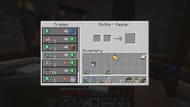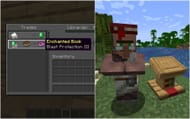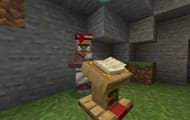Minecraft villager trading, enchanting system, and sandbox worlds provides players many possibilities for creativity and exploration. Among these features, trading with villagers stands out as a charming and immersive aspect of the game. Villagers, the friendly NPCs found in villages, offer diverse professions that determine the items they can trade with players.
Engaging in trades with villagers can be rewarding to acquire rare and valuable items, including enchanted books, maps, and potions.
Minecraft villager trading: All you need to know
Chart New Territories with the ultimate Minecraft Seed Generator!
Trading with villagers is simple. Several factors influence the availability, price, and quality of trades. These factors include the villager's profession, level, demand, supply, reputation, and mood. This comprehensive guide will delve into the various aspects of Minecraft villager trading. It will provide insights on locating and interacting with villagers, unlocking and enhancing trades, accessing discounts and special offers, and utilizing workstations to manipulate villager professions.
How do you turn villagers into traders?

To start Minecraft villager trading, you need to find a village first. Villages are randomly generated structures that can spawn in various biomes, such as plains, savanna, taiga, desert, snowy tundra, or mountains. You can also find village chests that may contain emeralds or other loot.
Villagers, the inhabitants, have distinct appearances and outfits based on their biome and profession. Minecraft offers 15 potential professions for villagers, ranging from armorer, butcher, and cartographer to cleric, farmer, fisherman, fletcher, leatherworker, librarian, mason, shepherd, toolsmith, weaponsmith, nitwit (without a profession), and the unemployed. Each domain corresponds to a unique workstation block that villagers must claim to offer trades associated with their work.
What do villagers trade with?

In Minecraft, emeralds serve as the primary currency for trading with villagers. These rare gems can be obtained by mining emerald ore, looting chests in villages or other structures, or through direct trade with villagers. Different villagers will either buy specific items from players in exchange for emeralds, such as crops from farmers or paper from librarians or sell things to players in exchange for emeralds, such as armor from armorers or maps from cartographers. Some trades may involve alternative items instead of emeralds, like rotten flesh for clerics or gravel for masons.
How to lock in trades with Minecraft villagers
Many novice professions in Minecraft offer various trades at their first level. To lock in a specific trade, players simply need to purchase any item from the villager. This action will lock the trade and profession, ensuring that the villager continues trading the same product and does not switch to any other profession.
How to unlock new Minecraft villager trades and get discounts

Each villager has five distinct levels within their profession: novice (one trade), apprentice (two trades), journeyman (three trades), expert (four trades), and master (five trades). As you trade with a villager, they gain experience points that gradually fill their XP bar. When the bar reaches capacity, the villager levels up, granting access to a new trade.
The level of a villager can be identified by observing the color of the badge on their outfit: stone (novice), iron (apprentice), gold (journeyman), emerald (expert), or diamond (master). Enhancing trade quality is also influenced by your reputation with the villagers. Reputation is a hidden score that reflects how well you interact with the villagers, and it affects their prices and overall mood.
Positive actions such as doing Minecraft villager trading frequently, curing zombie villagers by utilizing a splash potion of weakness and a golden apple, defending villages from raids, or ringing a bell during a raid, can bolster your reputation. Maintaining a high reputation entitles you to discounts and special offers from villagers, while a low reputation increases prices.
How to get discounts form Minecraft villagers

Discounts and special offers can be acquired through various means. Successfully defending a village from a raid grants you the hero of the village effect, which lasts approximately an hour and substantially reduces the prices of all trades. Villagers displaying a green particle effect around them indicate they are willing to trade one item for a single emerald, presenting an opportunity for special offers.
Another method for obtaining discounts lies in understanding the Minecraft villager trading supply and demand system. The prices of trades are not fixed but fluctuate based on the frequency of your trades with a particular villager. Each transaction possesses a demand value that influences the rate of price changes. Increased trading activity raises the demand value, causing prices to rise. Conversely, reduced trading activity decreases the demand value, lowering costs.
Unfortunately, discount system might go through a big changes, as part of rebalances introduced in Minecraft 1.20.2 villager trading update. However, these changes are experimental and might not make it to the game completely.
What is the best villager to trade with?

Opinions vary on the best profession in Minecraft villager trading. The Librarian clearly holds this title, providing a wide range of valuable enchantments, including an infinite emerald trade involving books and bookshelves. Following the Librarian, the villagers who trade diamond gear, such as the toolsmith, armorer, and weaponsmith, are considered the best.
How to change villager professions in Minecraft and reset trades

Changing villager professions can be done by utilizing workstations, a beneficial aspect of Minecraft villager trading. Workstations are specific blocks villagers require to claim a profession and offer trades associated with that profession. For instance, a lectern acts as the workstation for librarians, a smithing table for toolsmiths, and a composter for farmers.
Workstations offer two methods for changing or resetting villager professions: placing or removing workstations near villagers. Setting a workstation close to an unemployed villager will prompt them to claim it, thus adopting the corresponding job. Conversely, removing a workstation from a villager who has already claimed it will cause them to lose their profession and revert to unemployment.
Trading with villagers is one of the most rewarding and fun features. It allows players to obtain rare, invaluable items that may prove challenging or unattainable. Moreover, it adds depth and interaction to the game world and its inhabitants. Follow this guide to familiarize yourself with locating and interacting with villagers, unlocking and improving trades, accessing discounts and special offers, and utilizing workstations to manipulate villager professions. Happy trading!
Uncover new worlds with our Minecraft Seed Generator!

